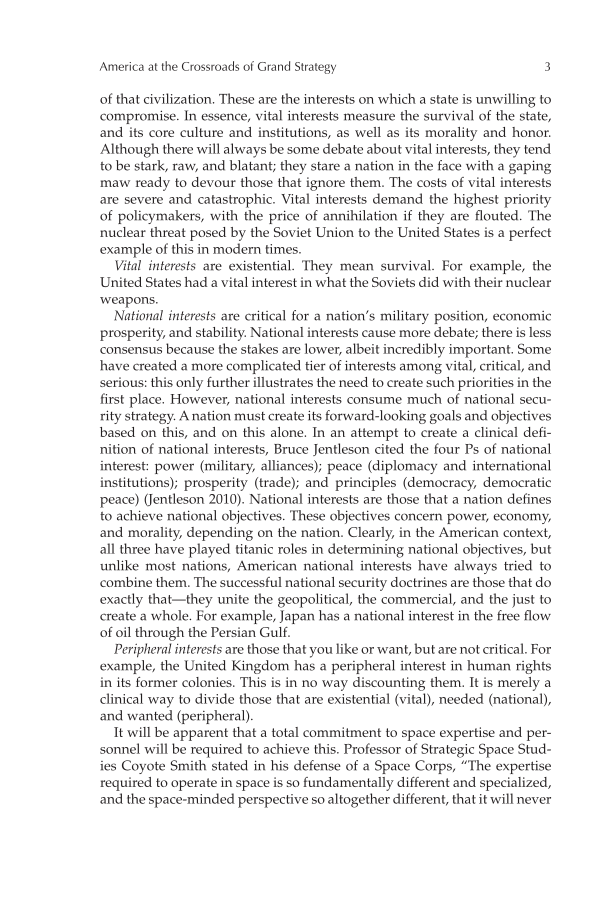America at the Crossroads of Grand Strategy 3 of that civilization. These are the interests on which a state is unwilling to compromise. In essence, vital interests measure the survival of the state, and its core culture and institutions, as well as its morality and honor. Although there will always be some debate about vital interests, they tend to be stark, raw, and blatant they stare a nation in the face with a gaping maw ready to devour those that ignore them. The costs of vital interests are severe and catastrophic. Vital interests demand the highest priority of policymakers, with the price of annihilation if they are flouted. The nuclear threat posed by the Soviet Union to the United States is a perfect example of this in modern times. Vital interests are existential. They mean survival. For example, the United States had a vital interest in what the Soviets did with their nuclear weapons. National interests are critical for a nation’s military position, economic prosperity, and stability. National interests cause more debate there is less consensus because the stakes are lower, albeit incredibly important. Some have created a more complicated tier of interests among vital, critical, and serious: this only further illustrates the need to create such priorities in the first place. However, national interests consume much of national secu- rity strategy. A nation must create its forward-looking goals and objectives based on this, and on this alone. In an attempt to create a clinical defi- nition of national interests, Bruce Jentleson cited the four Ps of national interest: power (military, alliances) peace (diplomacy and international institutions) prosperity (trade) and principles (democracy, democratic peace) (Jentleson 2010). National interests are those that a nation defines to achieve national objectives. These objectives concern power, economy, and morality, depending on the nation. Clearly, in the American context, all three have played titanic roles in determining national objectives, but unlike most nations, American national interests have always tried to combine them. The successful national security doctrines are those that do exactly that—they unite the geopolitical, the commercial, and the just to create a whole. For example, Japan has a national interest in the free flow of oil through the Persian Gulf. Peripheral interests are those that you like or want, but are not critical. For example, the United Kingdom has a peripheral interest in human rights in its former colonies. This is in no way discounting them. It is merely a clinical way to divide those that are existential (vital), needed (national), and wanted (peripheral). It will be apparent that a total commitment to space expertise and per- sonnel will be required to achieve this. Professor of Strategic Space Stud- ies Coyote Smith stated in his defense of a Space Corps, “The expertise required to operate in space is so fundamentally different and specialized, and the space-minded perspective so altogether different, that it will never
Document Details My Account Print multiple pages
Print
You have printed 0 times in the last 24 hours.
Your print count will reset on at .
You may print 0 more time(s) before then.
You may print a maximum of 0 pages at a time.









































































































































































